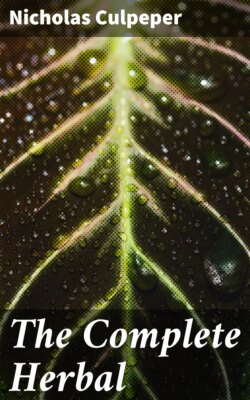Читать книгу The Complete Herbal - Nicholas Culpeper - Страница 60
На сайте Литреса книга снята с продажи.
BURNET.
ОглавлениеTable of Contents
It is called Sanguisorbia, Pimpinella, Bipulo, Solbegrella, &c. The common garden Burnet is so well known, that it needs no description.—There is another sort which is wild, the description whereof take as follows:—
Descript.] The great wild Burnet has winged leaves arising from the roots like the garden Burnet, but not so many; yet each of these leaves are at the least twice as large as the other, and nicked in the same manner about the edges, of a greyish colour on the under side; the stalks are greater, and rise higher, with many such leaves set thereon, and greater heads at the top, of a brownish colour, and out of them come small dark purple flowers, like the former, but greater. The root is black and long like the other, but greater also: it has almost neither scent nor taste therein, like the garden kind.
Place.] It first grows frequently in gardens. The wild kind grows in divers counties of this land, especially in Huntingdon, in Northamptonshire, in the meadows there: as also near London, by Pancras church, and by a causeway-side in the middle of a field by Paddington.
Time.] They flower about the end of June and beginning of July, and their seed is ripe in August.
Government and virtues] This is an herb the Sun challenges dominion over, and is a most precious herb, little inferior to Betony; the continual use of it preserves the body in health, and the spirits in vigour; for if the Sun be the preserver of life under God, his herbs are the best in the world to do it by. They are accounted to be both of one property, but the lesser is more effectual because quicker and more aromatic: It is a friend to the heart, liver, and other principal parts of a man’s body. Two or three of the stalks, with leaves put into a cup of wine, especially claret, are known to quicken the spirits, refresh and cheer the heart, and drive away melancholy: It is a special help to defend the heart from noisome vapours, and from infection of the pestilence, the juice thereof being taken in some drink, and the party laid to sweat thereupon. They have also a drying and an astringent quality, whereby they are available in all manner of fluxes of blood or humours, to staunch bleedings inward or outward, lasks, scourings, the bloody-flux, women’s too abundant flux of courses, the whites, and the choleric belchings and castings of the stomach, and is a singular wound-herb for all sorts of wounds, both of the head and body, either inward or outward, for all old ulcers, running cankers, and most sores, to be used either by the juice or decoction of the herb, or by the powder of the herb or root, or the water of the distilled herb, or ointment by itself, or with other things to be kept. The seed is also no less effectual both to stop fluxes, and dry up moist sores, being taken in powder inwardly in wine, or steeled water, that is, wherein hot rods of steel have been quenched; or the powder, or the seed mixed with the ointments.
